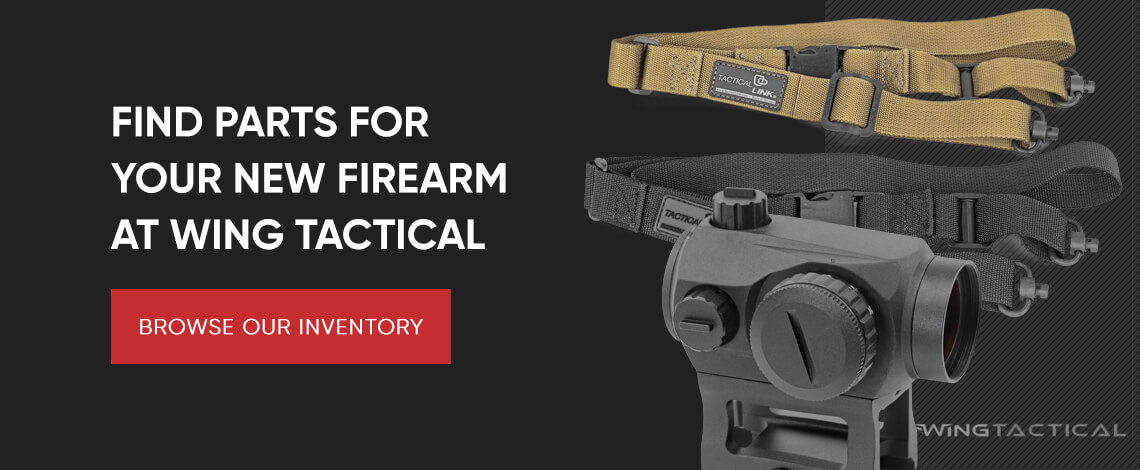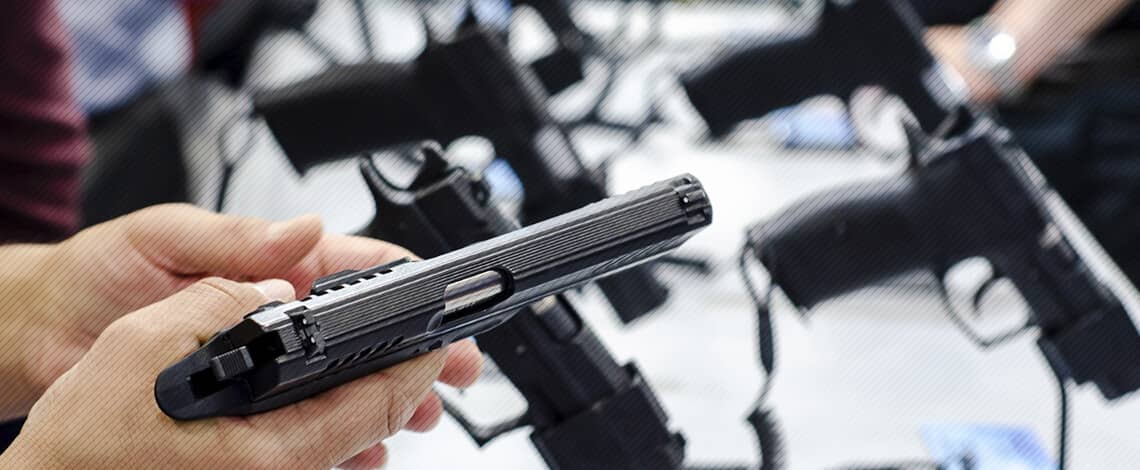
Buying your first gun is exciting for any new shooter. However, like buying a car or electronic device, there's far more to this process than simply walking into a store and selecting the first one that catches your eye. You'll need to determine why you want a gun, research the best firearms and calibers for your needs, understand gun laws and test out the firearm before you purchase it.
If you need some handy tips for first-time gun buyers, you've come to the right place. Here's what to know before buying a gun, including your reason for owning one, recommended calibers, accessories, gun laws and more.
What's the Purpose of the Firearm?
Before you start shopping or even researching guns, the question you need to ask yourself is why you want a gun. Most people have one of three answers:
- Self-defense
- Hunting
- Recreational shooting
Most guns are designed for one of these purposes, so it's important to find one that accommodates your needs. For instance, while a compact handgun is ideal for concealed carry, it won't be your best bet for hunting. A shotgun might be favorable for home defense in a rural area, while a lower-caliber pistol is probably more suited to apartment living.
Determining why you want a gun and what you'll use it for can help streamline the research and shopping process and make it more enjoyable. Additionally, you'll likely be more satisfied with your choice in the long haul.
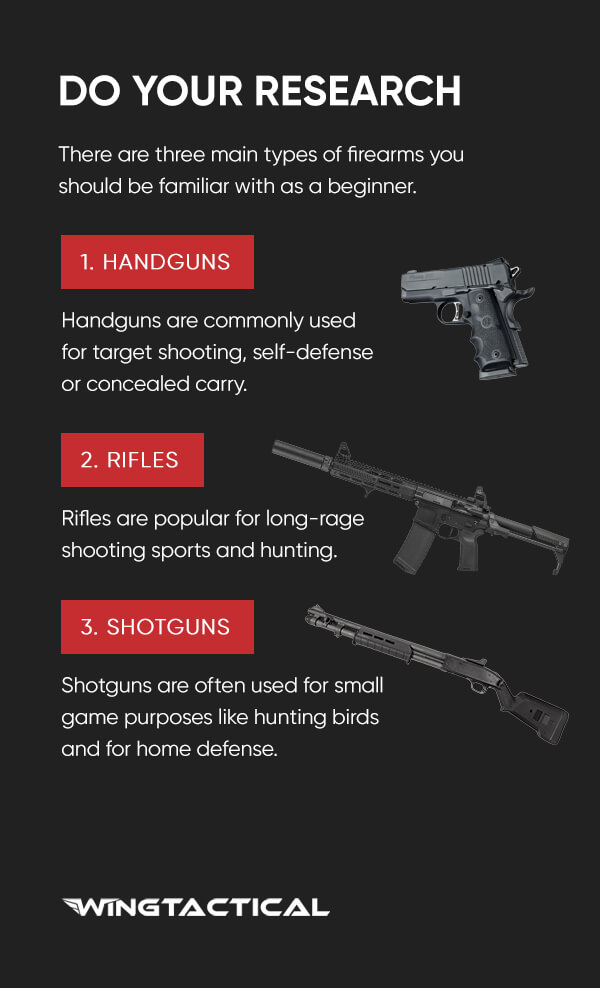
Do Your Research
There are three main types of firearms you should be familiar with as a beginner.
1. Handguns
Handguns are commonly used for target shooting, self-defense or concealed carry. There are various types of handguns, but the most common include:
- Semi-automatic pistols: Many people favor semi-automatic pistols for their versatility and ease of use. They use recoil energy from the last fired round to eject the empty cartridge, then chamber a new round. This means you can fire multiple rounds without reloading.
- Revolvers: These handguns feature cylinders that hold the rounds. Revolvers are popular for their reliability and ease of use, but they have lower capacity than semi-automatics.
2. Rifles
Rifles are popular for long-rage shooting sports and hunting. Two common types of rifles are:
- Bolt-action rifles: These are the oldest type and a popular choice for hunters due to their accuracy.
- Semi-automatic rifles: With their fast rate of fire and impressive accuracy, semi-automatic rifles — specifically AR-15s — have grown very favorable in recent years.
3. Shotguns
Shotguns are often used for small game purposes like hunting birds and for home defense. They come in many shapes and sizes and can fire small pellets, large pellets or slugs.
Pellet rounds have multiple pellets that spread out after firing, making them ideal for closer targets but less suitable for further distances. A slug is a powerful single round that doesn't spread — it's generally what you'd use when hunting bucks.
There are multiple types of shotguns, including semi-automatic and double-barrel, but pump-action is the most common type of shotgun. It's highly reliable and accommodates a wide variety of shooting purposes including home defense, law enforcement and military.
Once you've determined why you want a gun or you know the broad type you're interested in, you can start researching specific models and manufacturers. Reading online firearm reviews and asking friends and family for advice can help guide your decision.
Like anything else, cost will be an important factor when buying a gun. Thorough research can help you find a reliable, high-quality gun while staying within your budget. Be sure to factor in other expenses like ammo and accessories, as well.
Consider What Caliber Is Best for Your Needs
Caliber is another important consideration for first-time gun buyers. The term “caliber” refers to the internal diameter of a gun barrel and the diameter of the gun's ammunition. Handgun bullets are measured by caliber and can be expressed in inches or millimeters. If the caliber doesn't include “mm,” you can generally assume the unit of measurement is inches.
Handgun calibers are grouped into three categories — small, medium and large. The most common small calibers include:
- .32 Automatic Colt Pistol (ACP)
- .380
- .22 Long Rifle (LR)
Some popular medium-caliber sizes are:
- 9mm
- .40
- .38
Common large calibers include:
- 10mm
- .45 ACP
- .357 or .44 Magnum
As you can likely imagine, larger-caliber ammo travels faster and has greater target impact. The bullets themselves are larger, so naturally, the guns that use them are bigger, though you can also find more compact models with lower capacities. Many new shooters choose small-caliber, small-frame guns thinking they're easier to maneuver. However, this isn't always the case.
A fired 9mm bullet may create more recoil than a .32 ACP, but a full-sized 9mm model is surprisingly easier to handle than a compact .32 handgun. The 9mm gun's larger, heavier frame can absorb more force than the .32's smaller, lighter frame. You'll experience less recoil as a result.
So, what caliber will work best for you? It essentially boils down to what you feel most comfortable shooting. If factors like harder concealability and less controllable recoil steer you away from a .357 Magnum or .45 ACP, go for something lighter instead.
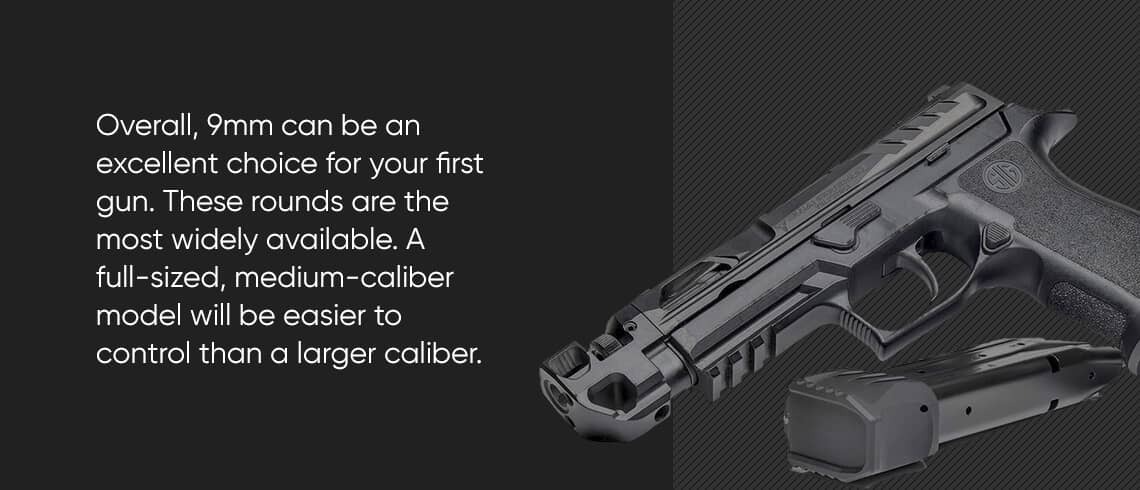
Overall, 9mm can be an excellent choice for your first gun. These rounds are the most widely available. A full-sized, medium-caliber model will be easier to control than a larger caliber. However, you might consider a more compact model if you plan to conceal carry for self-defense.
There's no shame in starting smaller with a .380 or .22 if that's what you feel most comfortable with. Go with the most power you can handle. Of course, the only way to determine the best caliber for you is by practicing at a range — more on this later.
Consider Any Accessories You Want to Add
There are a few things you'll need in addition to your gun, but other accessories are mostly for added luxury or functionality. Here are the essentials you'll need:
Ammunition
Stock up on some ammo once you've determined the ideal caliber size. A good rule to follow is to start out with 500 rounds for each regular-use handgun, 200 of them being for defensive ammo.
Over time, you should plan to build your ammo stash into the thousands. Try to buy a box or two each time you visit a sporting goods store or anywhere else that carries ammo. You'll find that doing so can boost your collection substantially.
Holster
You'll need a durable holster if you intend to carry the gun with you. There's a wide array of options, whether you want to carry it inside your waistband, on your belt, in your pocket, or even in a bag or purse.
For instance, an inside-the-waistband (IWB) holster can be a great concealed carry option, as it only exposes the butt and rear of the slide above the waistband. However, it isn't always the most comfortable style and can expose the firearm to perspiration. An IWB tends to work best with flatter, compact semi-automatics.
An outside-the-waistband (OWB) holster is typically better for a larger semi-automatic or revolver. Alternatively, you might find a pocket holster to be a good choice, as it protects the gun from snagging and allows for a clean draw when necessary.
Let your preferences, research, store personnel, and advice from fellow gun owners guide you in choosing the right holster.
Cleaning Supplies
Basic cleaning and maintenance supplies are another necessity for gun owners. A caliber-specific cleaning kit will generally include most or all of the essential cleaning supplies, such as:
- Cleaning rods
- Bore brushes
- Cleaning jags
- Cleaning patches
- Gun oil or lubricant
When cleaning your gun, you should always wear safety glasses to protect your eyes from flying springs, chemicals and other debris. Solvent-resistant gloves can also help prevent skin and chemical contact.
Storage
A secure storage method is a must when you own a firearm. A gun safe provides the most security and theft protection, but some other storage methods include:
- Firearm cabinets
- Firearm racks
- Firearm cases
- Trigger locks
Extra Magazines
Since a magazine is necessary to operate your gun — and it's usually the culprit when a mishap occurs — it helps to have some extra magazines handy. Ideally, you should have at least six magazines per gun. Try to avoid the habit of buying a new magazine, then storing it in a box without trying it out first. You want to catch a magazine failure right away, especially before an event where your life depends on it working.
There are many gun accessories and parts available, some more essential than others. When buying your first gun, it's best to start with these basics rather than buy a ton of accessories at once, especially ones you don't know how to use. Before getting your firearm, make a list of the fundamentals you'll need, then purchase them either before the gun or at the same time.
Additional Accessories
After you purchase the gun and necessary items — and gain experience shooting at a range — you can then determine if you'd like to add more accessories, like laser sights, to your gun. This will require some research, as well. For instance, you'll need to ensure the gun is compatible with an optic if you wish to install one.
If you're buying a handgun for self-defense purposes, you might also consider a high-quality tactical light that attaches to the gun. Alternatively, you could carry a compact, bright handheld flashlight. Many self-defense situations occur in dark areas or at night, so you want to be able to see your surroundings and a possible attacker.
Try at the Gun Range Before You Buy
Some of the best advice for first-time gun buyers is to try before you buy. Once you've made your list of first gun candidates, visit a reliable local gun store for some expert assistance.
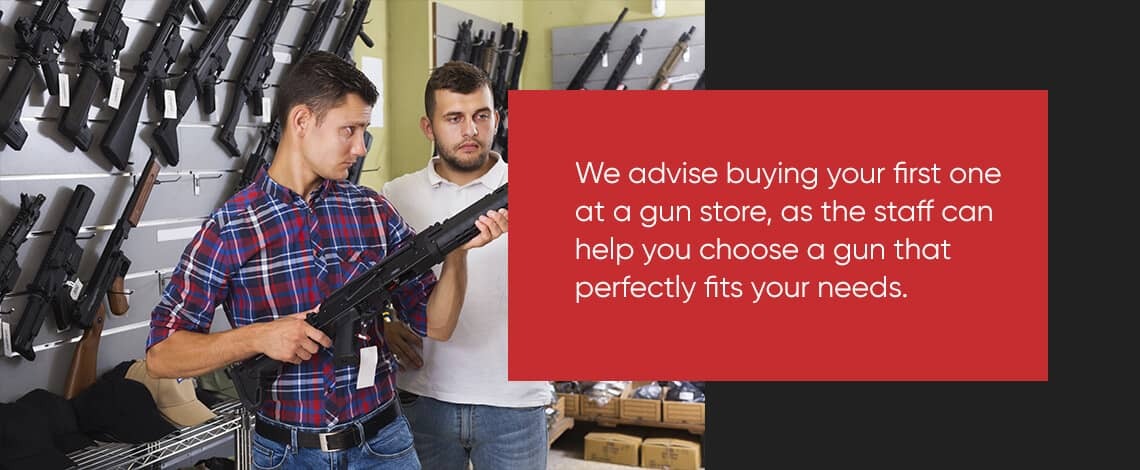
While it's perfectly legal to buy firearms online, from private sellers or at gun shows, we advise buying your first one at a gun store, as the staff can help you choose a gun that perfectly fits your needs. Additionally, they can help you complete your background check and ensure you're complying with other laws.
Explain that you're looking to buy your first gun. Show them your list, discuss your reasons for purchasing one, then ask for advice and recommendations. Even if they don't have the exact models you've researched, they may carry similar ones or can suggest others you haven't considered.
Try to visit a gun shop that also has a range if possible. Many ranges offer reasonable gun rental rates so you can test them out before buying. Pistols, rifles and shotguns all have different weights, handling and kickbacks, so live fire is the best way to ensure you're buying the right gun.
You can determine which one you're most comfortable with and what caliber works best for you. A seemingly perfect gun on paper may not be the best fit for your hand or on your hip, and you may find that a different one better suits your needs.
Know Your State's Laws Before You Purchase
Knowing your local firearm laws and regulations is crucial before purchasing your first gun. Depending on where you live, there may be restrictions regarding what types of firearms you can own and where you can conceal carry them.
Be sure to review your state's gun ownership laws and regulations in full. That way, you'll know the rules inside and out before buying your gun. These laws are subject to change, so try to stay on top of them. Remember that if you're moving to another state or traveling through a state while carrying your gun, you'll need to follow that state's laws, as well.
Final Thoughts
Once you've made your final decision, purchased your first gun and essential accessories, and brushed up on your state's gun laws, remember to practice shooting consistently — whether that means working with an experienced friend or family member or signing up for a class.
There are many resources available for new shooters. Just ask around, and you can easily find the help you need. As long as you practice regularly and keep your firearm well-cleaned and maintained, it should serve you well when you need it most.
Above all, remember to have fun with the research and shopping process. Buying your first gun is an exciting process, and owning a firearm is your right. So, why not exercise it?
Find Parts for Your New Firearm at Wing Tactical
Shopping for new parts and equipment adds to the excitement of buying your first gun. If you're a first-time gun owner looking for durable, high-quality firearm accessories, feel free to check out our selection at Wing Tactical. Browse our inventory of gun accessories and contact us with any questions about parts you might need!
